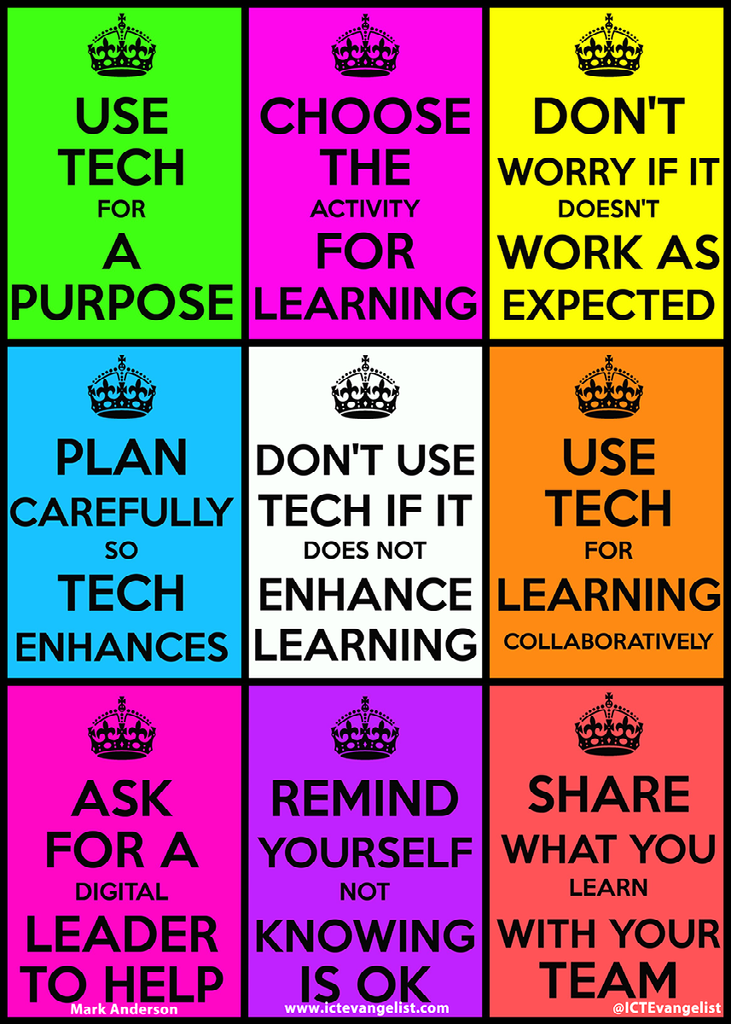HOW TO MAKE AN IMPACT WITH EDTECH IN YOUR SCHOOL OR CLASSROOM advice for those managing technology adoption and teachers in the classroom
There has been much talk in the media lately about technology in education, the large sums of money involved and the limited impact it has had upon results.
The OECD report on the surface of things looked pretty scathing. That's because popular media always looks for the big title to draw readers in. When you scratch beneath the surface though there are some things there that can really help. As Steve Wheeler writes about the report:
"It calls for new approaches to integrating technology into teaching, because at present technology use is not optimal...What the report is actually saying is that technology is no substitute for good pedagogy... It also suggests that technology can be a distraction for students if it is poorly deployed... Both conclusions tell us more about the pedagogy prevalent in schools than they do about the potential of technology." ~ Steve Wheeler
This of course makes absolute sense. Deploying technology without thinking about all the angles in to schools is like trying to cook a 1000 cover banquet without planning the menu. It is simply ridiculous. Yet it still happens, which is why we persist in seeing headlines like this in the media. As we see now, just like the Nesta report from 2012; if the conditions for success aren't planted long before technology hits the classroom; what's the point?
For teachers, half the battle with using tech is often the confidence to have a go yourself and to allow your students to have a go too; the other half is then to make that use purposeful, and not just shoe-horned in because you've been told you should use it.
For me, a significant part of the problem is actually that people focus upon all of this as being a technology 'thing'. That's the issue though. For me, technology has never been a technology thing; it is a LEARNING thing!
When we first started looking at iPads all those years ago, it was never thought of as being a technology project, but a learning project; a way to support and enhance and develop learning - and for me, that's always been where it's at.
In this Slate, I will be writing about the different ways in which we can think about tech use so that you can start to use it too - with confidence, time and space to grow and opportunities to develop yourself at a pace that's right for you.
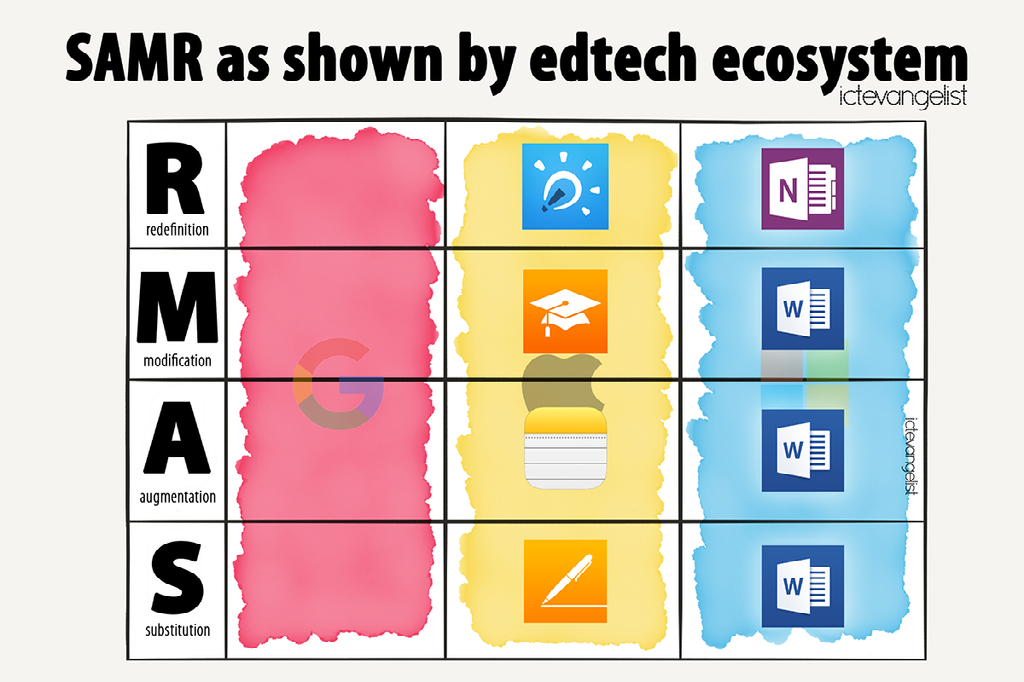
SAMR provides a useful framework to help with the thinking about purposeful tech but as this image hopefully illustrates, it's not quite as simple as you'd think. Word for example could reflect use which ranges from substitution right up to modification. iOS gives a massive wide range of options to how you might use your technology. As for Google, the opportunities across nearly all of the Google Apps for Education Apps give opportunities across the SAMR range. And then there's the fact that actually, SAMR isn't even a ladder.
Some people reading this might not know what SAMR is so please take the time to read up on it - it really can be helpful in your thinking about how to purposefully use technology, which leads nicely on to the first of nine ideas for how you can effectively start to use technology in the classroom.
"My biggest takeaway from your book was SAMR - it made me realise I should be using technology for purposeful reasons, not just because I thought I should be using technology." ~ Abbie Mann
use tech for a purpose
That's right... This isn't anything to do with SAMR or anything else. Just make sure you are using technology to enhance learning. Don't just use it to tick a box on your performance management or as a panacea for bad teaching.
"Technology can amplify great teaching, but just doesn't replace poor teaching." ~ Andreas Schleicher
Use it for purposeful reasons and perhaps think a bit more deeply than asking your pupils to use technology for research. If you're looking to tread lightly in to the world of using tech then why not ask students to demonstrate what they've learned this week in the form of a word cloud.
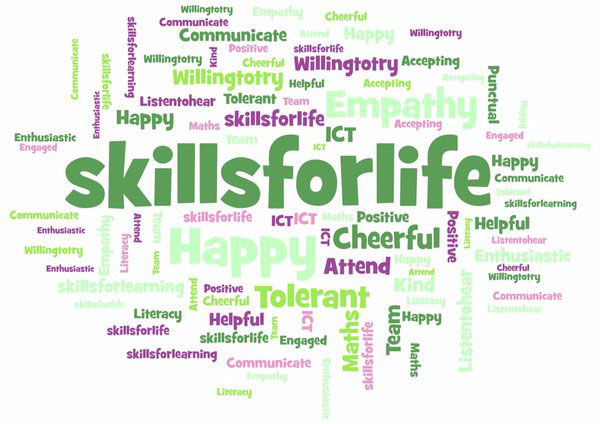
In the words of this teacher:
"...compared to summing up on post its/exit tickets I got to see so much more of what they knew." ~ Vicki Vincent
choose the activity for learning
This means adopting a pedagogy first approach to your use of technology. The TPACK model develops the idea of PCK. PCK is that blend of pedagogical and content knowledge that you have as a superb teacher that you use in the classroom every day. TPACK takes it to the next level and asks you to add technology to the mix. As shown in the diagram below, TPACK is about blending your knowledge of pedagogy, content and technological knowledge to create rich, inspiring, relevant and authentic learning experiences for young people.
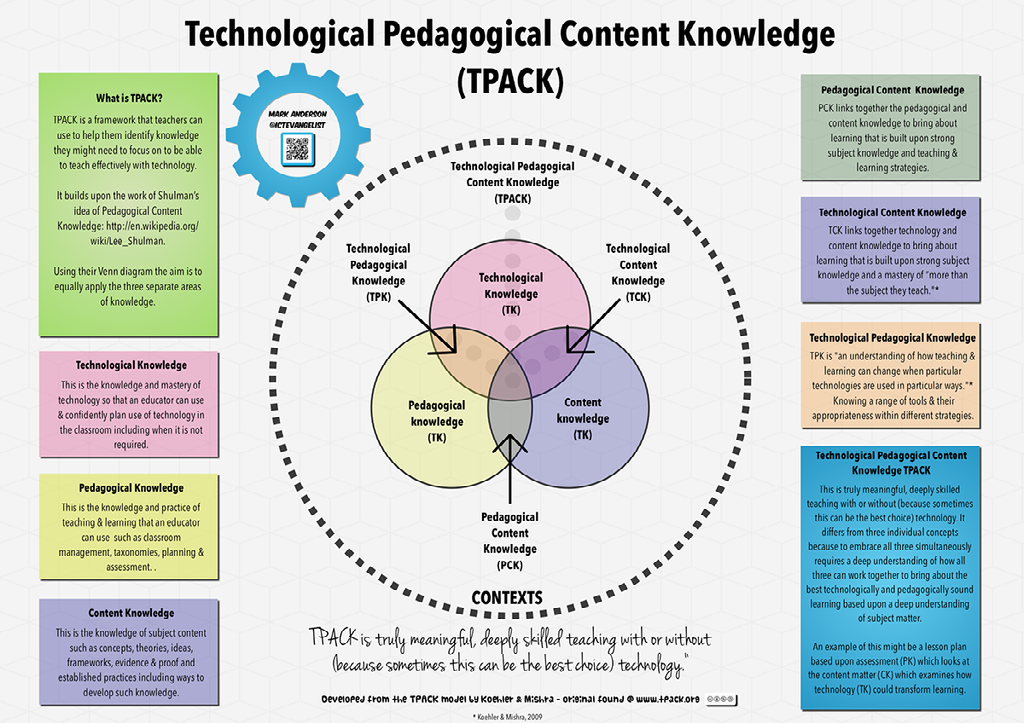
As noted in the image above, TPACK is truly meaningful, deeply skilled teaching with or without technology. This is absolutely spot on. In the many schools and teachers I have worked with it is those classrooms where educators are making informed choices about their use of technology where it is having the biggest impact; not schools where technology use is dictated to teachers, not where technology use is forced upon people ill equipped to use it.
A pedagogy first approach is absolutely essential if you're going to make the use of your technology purposeful so that it enhances learning. If you start your planning with the technology and then make the work sit around that then you're going to come unstuck. Gimmicks too will be seen through pretty sharply by your pupils too. Learning is tough. Technology can help, sure, but it won't do it for you.
Don't worry if it doesn't work as expected
I can't remember whether it was my old Head Teacher John Wells or me who said that teachers are the masters of pedagogy and students are the masters of technology. Either way, it's something that has stuck with me. Digital leaders are an absolute must in my estimation to ensure the success of technology use across the curriculum to support learning.
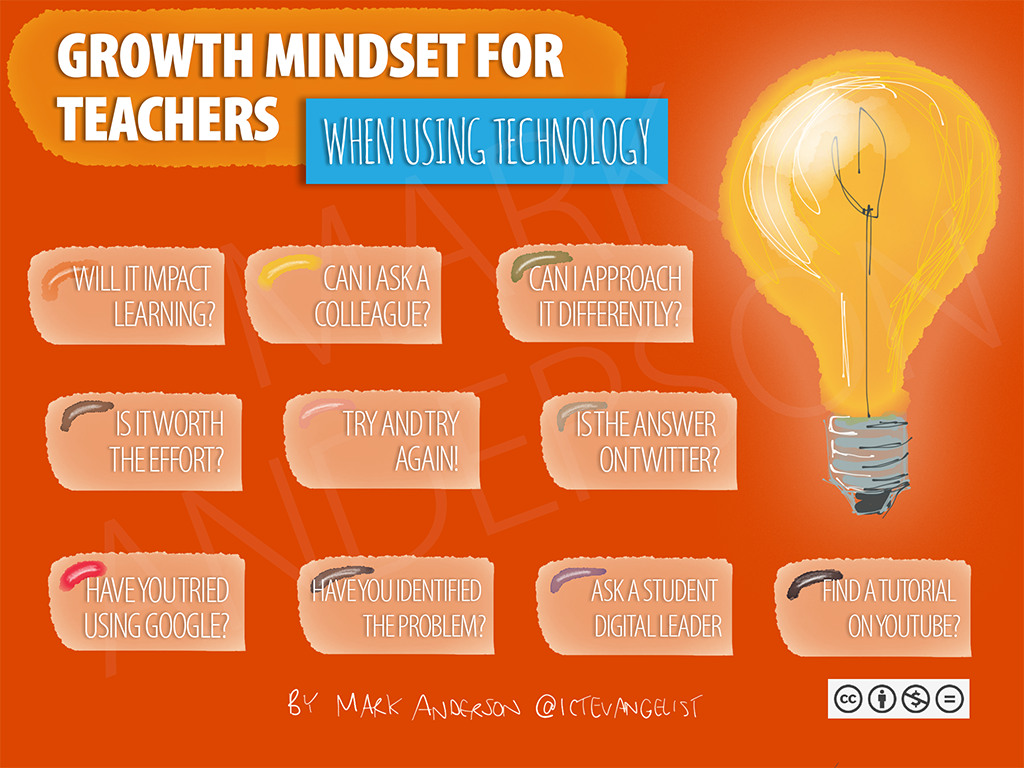
Started in the UK some time ago by Kristian Still after reading about them in the US, Kristian worked with Dan Stucke and saw the impact that they could have in schools. Taken on some time after that by the SSAT, the initiative faded over a while. Jump forward a year or two and there were now more digital leader groups around the country but no real coherence or link ups between the groups in schools. At this point following a conversation between us both, Sheli Blackburn and I started the digital leader network and tried to promote digital leaders more across social media and beyond. Since then Sheli has worked tirelessly to promote digital leaders in the UK and beyond. Her work has seen her nominated for all kinds of strongly deserved awards.
Having Digital Leaders in your classroom to help when things go wrong, or running sessions to support your professional learning on how to use technology can be transformational in a school. I cannot urge you more strongly to start them any more than I am here. If you'd like help, try checking out the #DLChat hashtag on Twitter or use the links above. The Digital Leader chat takes place every Thursday night at 9pm GMT.
plan carefully so tech enhances
If you fail to plan your use of technology then there's every chance it might not work as expected. If you aren't too sure then ask for help if you need it. There will be someone in your school, be it your school tech coach, digital champion or student digital leaders. Either way, plan it and if it's your first time - try it out first. Don't expect something you've prepared at home to be able to work in school straight away. Internet filters in schools can be funny things. Make sure it works before trying it out live in class.
A good analogy here might be in the planning of a Science lesson. It might be that you've taught a certain experiment based lesson 100 times, but even so - whilst the planning on the 101st occasion might require a little less preparation; it still doesn't mean you won't prepare. You will still take the same safety precautions and testing as you always do. Prepare your use of tech with the same level of focus. Learning is too important to leave to chance. If you aren't sure, ask.
don't use tech if it does not enhance learning
Hopefully you work in a school where you embrace the potential of technology without the pressure of having to use it every lesson. If you do, it's something I would question. As written by Matt Pearson some while ago, there is no magic learning dust that flies out the back of an iPad. You should as a general rule of thumb, question when you're using tech whether or not it's a worthwhile endeavour. Could the activity be done more quickly, effectively, without the technology. Sure, there's always that cherry that many use, myself included, about student engagement; but if it can be done better without technology, it probably should be, shouldn't it?
"If you bring in these technologies and don’t think ahead to how they’ll be used to promote learning and the acquisition of skills, then the only thing that will change in school is the electric bill." ~ David Thornburg
use tech for learning collaboratively
It is definitely true that technology gives us the opportunity to do things that wouldn't be possible if it weren't for the technology. Take the collaborative opportunities afforded by offerings such as Google Apps for Education. It can help provide learning opportunities for pupils to the next level by supporting collaboration in ways not possible without technology; not only within your own school but beyond.
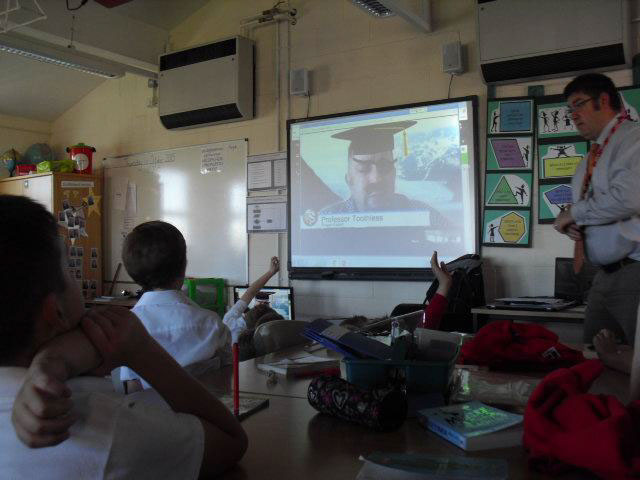
Why not take part in inter-school story writing? Get an expert to come in to your school virtually to share ideas with your pupils. Get students to develop and refine their work based upon suggestions from peers using the 'suggestion' tool in Google Docs. There is quite literally so much you can do. And that's without even mentioning Google Classroom - whoops there I went!
ask for a digital leader to help
I realise asking a young person for help might be a difficult thing to do for some people. Admitting that in some areas young people know more than us. We are after all the sages on the stage, surely? Errrr, no. And capitalising on developing young people in student ambassadorship roles can be massively motivating for young people. I've been fortunate enough to work with many schools on Digital Leaders, to help them get them set up, to organise digital leader events and much more. Such is the power of student ambassadorship, as mentioned earlier in this document, you'd be foolhardy to not look at how Digital Leaders can help transform learning in your school.
Here are just a few things Digital Leaders can do:
- Help with tech use in lessons
- Involve them in e-safety conversations and reviews
- Involve them in deciding policies relating to the use of technology
- Blog about how to use different apps
- Give ideas on how they use technology to help their own learning
- Arrange for bespoke training for you to help with what you want to learn
- Run genius bars and other help sessions over breaks, lunches and parent / teacher conferences
- Work with local schools to act as a bridge to forge links between schools
- Support primary / secondary schools in a reciprocal way
- Speak at public events such as BETT
- Run their own YouTube channel with screencasts to help
- Support with the Computing curriculum, especially in Primary
I know I've said it above but please consider setting up a Student Digital Leader ambassadorship programme in your school.
remind yourself not knowing is ok
It may well be that the last computer you actually owned was your Sinclair ZX Spectrum in 1988 and you threw that away because the cassettes took too long to load your games. Even if that was the case and you are one of the most hardened anti-tech teachers, you will still need to use technology in some form in your day job; even if that is just to take the register in your laptop or to check your emails. Either way, it's fine for you to not know everything when it comes to technology. That's why training and support is important.
In previous posts such as the one above, I've talked about leadership teams planning to use 25% of the budget for technology to support with professional development opportunities linked to the use of technology. Whilst not knowing is ok whilst you are developing your confidence, you should have opportunities to help develop your skills. This could be in:
- colleague led inspiration sessions
- learning about pedagogy behind technology use
- support from digital leaders
- attending courses such as those offered by Dragonfly
- attending Teachmeets
- working with a trainer in school
Either way and whatever your leadership team choose to do; technology is too expensive to leave its use to chance. Otherwise it more than likely won't be used at all! One word of advice when it comes to trainers and software companies. Be mindful of those who promise the earth and make offers without you realising they are trying to sell you something. Buyer beware!
share what you learn
No person is an island, or something like that - what I mean to say is; we can be isolated enough in our profession, stuck in our classrooms all day only ever seeing children or an adult popping in to do a learning walk once a week. Why not share what you have been working on and the wins you've had with your colleagues on your team, or on your school learning community website or Google Plus community (not got one? get one!).
If you're a middle leader, why not have an open agenda item every meeting to discuss teaching & learning in your responsibility area for your team to share their wins that week. Sharing is most definitely caring and by doing this you can build a picture of what is really working for your team.
So there you go - I really hope these 9 points really do help. I'll put some links to some great blogs and sites to help you with your learning journey below. One thing I would say to remember is this; always keep learning the focus, and if you're not sure - step away from the shiny shiny and refocus on the learny learny.
Below is the meme I made a while ago which inspired this extended piece of writing. Thanks for reading this far.
